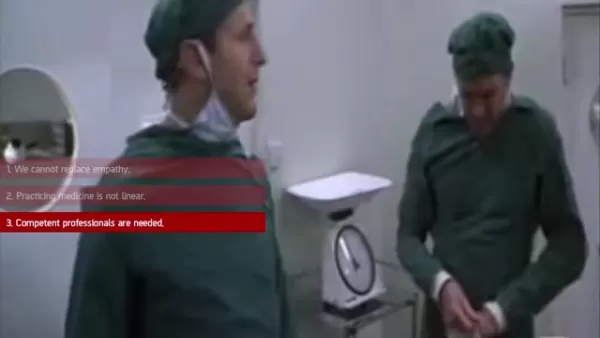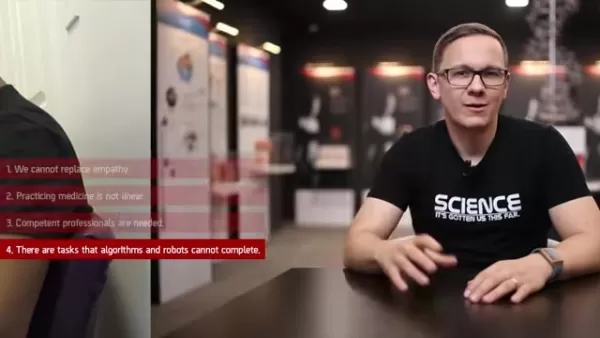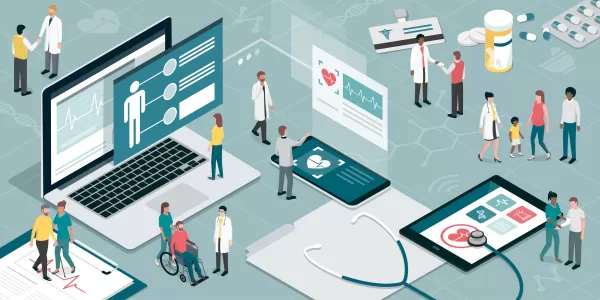AI in Healthcare: Physicians Distinguish Fact from Fiction
The rapid evolution of artificial intelligence (AI) is reshaping many sectors, including healthcare. While the integration of AI into medicine sparks both excitement and concern, the irreplaceable nature of physicians remains clear. In this piece, we'll explore why, despite AI's advancements, doctors are still essential. We'll tackle issues like job displacement and highlight the unique human traits that AI can't replicate. Keep reading to understand the vital roles humans will continue to fulfill in the future of healthcare.
Why AI Will Not Replace Physicians
The Irreplaceable Role of Empathy in Medicine
One of the key reasons AI can't fully replace physicians is its inability to replicate human empathy. Medicine isn't just about diagnosing diseases; it's about connecting with patients on a human level. Building a relationship of trust with patients helps guide them through their medical journey, making them feel safe, understood, and seen.

Empathy involves recognizing and sharing another person's feelings, allowing doctors to provide comfort, support, and personalized care that goes beyond what algorithms can offer. Receiving a life-changing diagnosis from a caring human being who can offer a gentle touch, make eye contact, and provide thoughtful advice is irreplaceable. Although there are experiments teaching chatbots to mimic empathy, genuine empathy requires a deep understanding of human emotions, which AI currently lacks. Patients need to trust their caregivers, and this trust is built on human interaction and connection.
AI can aid in mental health support, helping those hesitant to seek help to speak openly without fear of judgment. However, AI can only serve as a stepping stone to professional help; it can aid empathy, but it cannot replace it.
Key Components of Empathy in Healthcare:
- Active Listening: Truly hearing and understanding the patient's concerns.
- Emotional Support: Offering comfort and reassurance during difficult times.
- Personalized Care: Tailoring treatment plans to meet individual patient needs.
Empathy not only provides emotional understanding but also helps doctors better diagnose patients by extracting key information that might otherwise be missed, especially when patients are not forthcoming.
Practicing Medicine is Non-Linear: The Need for Creative Problem-Solving
Medicine is far from a straightforward, linear process. It involves creative problem-solving, critical thinking, and the ability to adapt to unexpected situations. Patients don't always present with textbook symptoms, and diagnoses can be complex and multifaceted.

Consider the discussions doctors have when determining a diagnosis. They analyze symptoms, test results, and potential causes. An algorithm might process data quickly, but it often misses the nuances and subtle clues that a human doctor would pick up on. Medicine requires flexibility and the ability to think outside the box, qualities AI often struggles with.
Key Attributes of Non-Linear Medical Practice:
- Adaptability: Adjusting treatment plans based on patient responses and evolving conditions.
- Critical Thinking: Analyzing complex data and considering multiple possibilities.
- Intuition: Leveraging experience and insight to make informed decisions in ambiguous situations.
These attributes are challenging to encode into algorithms. Life is diverse, and patients don't fit neatly into pre-selected data sets used in AI studies. The human ability to analyze in detail and think creatively is invaluable.
Competent Professionals Are Essential for Operating Complex Digital Technologies
Sophisticated digital health solutions, such as surgical robots and smart algorithms, require the expertise of qualified doctors to operate effectively. The idea that AI will become so advanced that anyone can operate it is misguided. While AI can assist doctors, it cannot function independently in many critical areas.

Qualified doctors bring years of training and experience, enabling them to make informed decisions, interpret data accurately, and handle unexpected complications. The data provided by AI systems can be complex, and only competent professionals can ensure it's used safely and ethically.
Examples of Competent Professional Roles:
- Surgical Robotics: Surgeons need expertise to control robotic arms and make precise movements.
- AI Diagnostics: Physicians must interpret AI-generated reports and incorporate them into a comprehensive diagnosis.
- Data Management: Healthcare professionals need to manage and secure patient data while maintaining privacy and compliance.
Even the most advanced technology requires manual labor, highlighting the ongoing need for competent doctors.
The Uncompletable Tasks: Algorithms and Robots' Limitations
There are numerous tasks that algorithms and robots cannot complete effectively. While AI excels at processing data and performing repetitive tasks, it falls short in situations requiring human interaction, emotional intelligence, and hands-on skills.
For instance, while IBM Watson can analyze vast amounts of data, it cannot perform the Heimlich maneuver or administer a shot while comforting a child. These tasks require human touch, understanding, and emotional connection.
Key Tasks Algorithms and Robots Cannot Complete:
- Performing Hands-On Procedures: Administering injections, performing CPR, and assisting in emergency situations.
- Providing Emotional Support: Comforting patients, offering reassurance, and addressing their emotional needs.
- Making Ethical Judgments: Weighing complex ethical considerations and making decisions that align with patient values.
Humans are often faster, more reliable, or cheaper than technology in these tasks, emphasizing the importance of balancing technological advancements with human expertise in healthcare.
Humans and Technology: A Collaborative Approach
The real power lies in collaboration, not competition. The goal is to equip physicians with new tools to enhance their capabilities. AI and human expertise are most potent when working together, each complementing the other's strengths.
For example, a study on metastatic breast cancer used deep learning for accurate predictions, but the diagnostic results improved significantly when combined with a pathologist's diagnosis.
Benefits of Human-Technology Collaboration:
- Improved Accuracy: Combining AI predictions with human judgment leads to more accurate diagnoses.
- Increased Efficiency: AI automates repetitive tasks, freeing up doctors to focus on complex cases.
- Enhanced Patient Care: Doctors can provide more personalized and effective care with the support of AI-driven insights.
The best use of technology is to support and enable human doctors, improving their service so patients can benefit safely and supportively. By fostering a collaborative environment, we can harness AI's power to improve healthcare outcomes while preserving the irreplaceable human element.
Related article
 Google's Gemini app adds real-time AI video, Deep Research, and new features (120 chars)
Google unveiled significant Gemini AI enhancements during its I/O 2025 developer conference, expanding multimodal capabilities, introducing next-generation AI models, and strengthening ecosystem integrations across its product portfolio.Key Gemini Li
Google's Gemini app adds real-time AI video, Deep Research, and new features (120 chars)
Google unveiled significant Gemini AI enhancements during its I/O 2025 developer conference, expanding multimodal capabilities, introducing next-generation AI models, and strengthening ecosystem integrations across its product portfolio.Key Gemini Li
 Assort Health Secures $50M Funding to Automate Patient Communication
Assort Health, an emerging AI healthcare startup specializing in automated patient communications for specialty practices, has secured approximately $50 million in Series B funding at a $750 million valuation, according to sources familiar with the t
Assort Health Secures $50M Funding to Automate Patient Communication
Assort Health, an emerging AI healthcare startup specializing in automated patient communications for specialty practices, has secured approximately $50 million in Series B funding at a $750 million valuation, according to sources familiar with the t
 Generate Excel Formulas Instantly with AI-Powered Excel Tool
Transform your spreadsheet workflow with GPTExcel - the AI-powered solution that converts natural language descriptions into precise Excel and Google Sheets formulas. This powerful tool eliminates the frustration of manual formula creation, making co
Comments (1)
0/200
Generate Excel Formulas Instantly with AI-Powered Excel Tool
Transform your spreadsheet workflow with GPTExcel - the AI-powered solution that converts natural language descriptions into precise Excel and Google Sheets formulas. This powerful tool eliminates the frustration of manual formula creation, making co
Comments (1)
0/200
![JamesCarter]() JamesCarter
JamesCarter
 August 26, 2025 at 2:37:10 AM EDT
August 26, 2025 at 2:37:10 AM EDT
AI in healthcare sounds cool, but I’m skeptical—can it really understand patients like doctors do? 🤔 Still, it’s exciting to think about faster diagnoses!


 0
0
The rapid evolution of artificial intelligence (AI) is reshaping many sectors, including healthcare. While the integration of AI into medicine sparks both excitement and concern, the irreplaceable nature of physicians remains clear. In this piece, we'll explore why, despite AI's advancements, doctors are still essential. We'll tackle issues like job displacement and highlight the unique human traits that AI can't replicate. Keep reading to understand the vital roles humans will continue to fulfill in the future of healthcare.
Why AI Will Not Replace Physicians
The Irreplaceable Role of Empathy in Medicine
One of the key reasons AI can't fully replace physicians is its inability to replicate human empathy. Medicine isn't just about diagnosing diseases; it's about connecting with patients on a human level. Building a relationship of trust with patients helps guide them through their medical journey, making them feel safe, understood, and seen.

Empathy involves recognizing and sharing another person's feelings, allowing doctors to provide comfort, support, and personalized care that goes beyond what algorithms can offer. Receiving a life-changing diagnosis from a caring human being who can offer a gentle touch, make eye contact, and provide thoughtful advice is irreplaceable. Although there are experiments teaching chatbots to mimic empathy, genuine empathy requires a deep understanding of human emotions, which AI currently lacks. Patients need to trust their caregivers, and this trust is built on human interaction and connection.
AI can aid in mental health support, helping those hesitant to seek help to speak openly without fear of judgment. However, AI can only serve as a stepping stone to professional help; it can aid empathy, but it cannot replace it.
Key Components of Empathy in Healthcare:
- Active Listening: Truly hearing and understanding the patient's concerns.
- Emotional Support: Offering comfort and reassurance during difficult times.
- Personalized Care: Tailoring treatment plans to meet individual patient needs.
Empathy not only provides emotional understanding but also helps doctors better diagnose patients by extracting key information that might otherwise be missed, especially when patients are not forthcoming.
Practicing Medicine is Non-Linear: The Need for Creative Problem-Solving
Medicine is far from a straightforward, linear process. It involves creative problem-solving, critical thinking, and the ability to adapt to unexpected situations. Patients don't always present with textbook symptoms, and diagnoses can be complex and multifaceted.

Consider the discussions doctors have when determining a diagnosis. They analyze symptoms, test results, and potential causes. An algorithm might process data quickly, but it often misses the nuances and subtle clues that a human doctor would pick up on. Medicine requires flexibility and the ability to think outside the box, qualities AI often struggles with.
Key Attributes of Non-Linear Medical Practice:
- Adaptability: Adjusting treatment plans based on patient responses and evolving conditions.
- Critical Thinking: Analyzing complex data and considering multiple possibilities.
- Intuition: Leveraging experience and insight to make informed decisions in ambiguous situations.
These attributes are challenging to encode into algorithms. Life is diverse, and patients don't fit neatly into pre-selected data sets used in AI studies. The human ability to analyze in detail and think creatively is invaluable.
Competent Professionals Are Essential for Operating Complex Digital Technologies
Sophisticated digital health solutions, such as surgical robots and smart algorithms, require the expertise of qualified doctors to operate effectively. The idea that AI will become so advanced that anyone can operate it is misguided. While AI can assist doctors, it cannot function independently in many critical areas.

Qualified doctors bring years of training and experience, enabling them to make informed decisions, interpret data accurately, and handle unexpected complications. The data provided by AI systems can be complex, and only competent professionals can ensure it's used safely and ethically.
Examples of Competent Professional Roles:
- Surgical Robotics: Surgeons need expertise to control robotic arms and make precise movements.
- AI Diagnostics: Physicians must interpret AI-generated reports and incorporate them into a comprehensive diagnosis.
- Data Management: Healthcare professionals need to manage and secure patient data while maintaining privacy and compliance.
Even the most advanced technology requires manual labor, highlighting the ongoing need for competent doctors.
The Uncompletable Tasks: Algorithms and Robots' Limitations
There are numerous tasks that algorithms and robots cannot complete effectively. While AI excels at processing data and performing repetitive tasks, it falls short in situations requiring human interaction, emotional intelligence, and hands-on skills.
For instance, while IBM Watson can analyze vast amounts of data, it cannot perform the Heimlich maneuver or administer a shot while comforting a child. These tasks require human touch, understanding, and emotional connection.
Key Tasks Algorithms and Robots Cannot Complete:
- Performing Hands-On Procedures: Administering injections, performing CPR, and assisting in emergency situations.
- Providing Emotional Support: Comforting patients, offering reassurance, and addressing their emotional needs.
- Making Ethical Judgments: Weighing complex ethical considerations and making decisions that align with patient values.
Humans are often faster, more reliable, or cheaper than technology in these tasks, emphasizing the importance of balancing technological advancements with human expertise in healthcare.
Humans and Technology: A Collaborative Approach
The real power lies in collaboration, not competition. The goal is to equip physicians with new tools to enhance their capabilities. AI and human expertise are most potent when working together, each complementing the other's strengths.
For example, a study on metastatic breast cancer used deep learning for accurate predictions, but the diagnostic results improved significantly when combined with a pathologist's diagnosis.
Benefits of Human-Technology Collaboration:
- Improved Accuracy: Combining AI predictions with human judgment leads to more accurate diagnoses.
- Increased Efficiency: AI automates repetitive tasks, freeing up doctors to focus on complex cases.
- Enhanced Patient Care: Doctors can provide more personalized and effective care with the support of AI-driven insights.
The best use of technology is to support and enable human doctors, improving their service so patients can benefit safely and supportively. By fostering a collaborative environment, we can harness AI's power to improve healthcare outcomes while preserving the irreplaceable human element.
 Assort Health Secures $50M Funding to Automate Patient Communication
Assort Health, an emerging AI healthcare startup specializing in automated patient communications for specialty practices, has secured approximately $50 million in Series B funding at a $750 million valuation, according to sources familiar with the t
Assort Health Secures $50M Funding to Automate Patient Communication
Assort Health, an emerging AI healthcare startup specializing in automated patient communications for specialty practices, has secured approximately $50 million in Series B funding at a $750 million valuation, according to sources familiar with the t
 Generate Excel Formulas Instantly with AI-Powered Excel Tool
Transform your spreadsheet workflow with GPTExcel - the AI-powered solution that converts natural language descriptions into precise Excel and Google Sheets formulas. This powerful tool eliminates the frustration of manual formula creation, making co
Generate Excel Formulas Instantly with AI-Powered Excel Tool
Transform your spreadsheet workflow with GPTExcel - the AI-powered solution that converts natural language descriptions into precise Excel and Google Sheets formulas. This powerful tool eliminates the frustration of manual formula creation, making co
 August 26, 2025 at 2:37:10 AM EDT
August 26, 2025 at 2:37:10 AM EDT
AI in healthcare sounds cool, but I’m skeptical—can it really understand patients like doctors do? 🤔 Still, it’s exciting to think about faster diagnoses!


 0
0





























